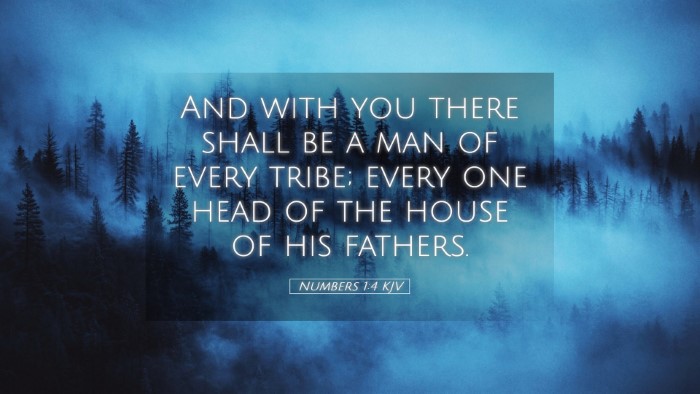Commentary on Numbers 1:4
Numbers 1:4 states:
"And with you there shall be a man of every tribe; every one head of the house of his fathers."
This verse introduces a critical phase in the narrative of the Israelites' journey through the wilderness, emphasizing God's organizational structure and leadership among His people. Below are insights drawn from various public domain commentaries.
General Overview
The Book of Numbers, known for its census and the organization of the tribes of Israel, marks a significant shift as the Israelites prepare for their journey to the Promised Land. This particular verse underscores the importance of leadership and representation within the community.
Insights from Commentators
Matthew Henry's Commentary
Matthew Henry emphasizes the ordered nature of God’s people, highlighting that leadership is vital for maintaining structure and unity. He notes that:
- The selection of a leader from each tribe reflects God's acknowledgment of tribal divisions and the importance of representation.
- This organization serves to foster unity among diverse groups while preparing them for collective responsibility.
- Henry suggests that these leaders were chosen to ensure accountability and facilitate the implementation of God's commands within their respective tribes.
Albert Barnes' Notes on the Bible
Albert Barnes provides a detailed observation of the cultural and historical context of tribal leadership:
- He notes that each tribe's head symbolizes not only authority but also the familial ties that bind the people of Israel together.
- Barnes emphasizes that the inclusion of leaders signifies the collectivist nature of Israel's society, which values familial lineage and heritage.
- According to Barnes, the verse serves as a reminder that God works through established social structures, re-enforcing the idea that divine guidance operates within human institutions.
Adam Clarke's Commentary
Adam Clarke offers insights into the implications of this verse for contemporary readers:
- He points out that having designated leaders from each tribe allowed for efficient governance and conflict resolution among the people.
- Clarke stresses the importance of having representatives who are able to articulate the collective needs of their tribes to Moses and the leadership.
- He also remarks on the spiritual significance of leadership, noting that it reflects God's design in creating order and hierarchy among His people.
Theological Implications
This verse not only discusses organizational leadership but also reflects theological truths about God's nature and His relationship with Israel:
- Representation: Each head represents the entire tribe, indicating that God values every individual within the community.
- Divine Order: The call for leaders underscores the principle of order which is foundational in the governance of God’s people.
- Responsibility: Leaders are entrusted with the responsibility of guiding and protecting their tribe, foreshadowing the role of Christ as the ultimate leader of His people.
Applications for Modern Leadership
For pastors, students, and theologians, Numbers 1:4 serves as a foundational text for understanding effective leadership in ministry:
- Importance of Representation: Leaders should strive to represent their communities and ensure that all voices are heard.
- Accountability: Spiritual leaders should be accountable to their congregations and uphold the integrity of their leadership role.
- Collaboration: The verse suggests the value of collaboration among leaders for the benefit of the community, promoting unity in diversity.
Conclusion
Numbers 1:4 not only sets the stage for the Israelite's organization in the wilderness but also provides a timeless principle on the nature of leadership within the community of faith. The insights gleaned from commentaries by Matthew Henry, Albert Barnes, and Adam Clarke illuminate the significance of godly leadership as fundamentally tied to divine order, responsibility, and representation. Pastors and scholars alike can draw from this understanding to foster a spirit of unity and effective governance in their respective ministries.


